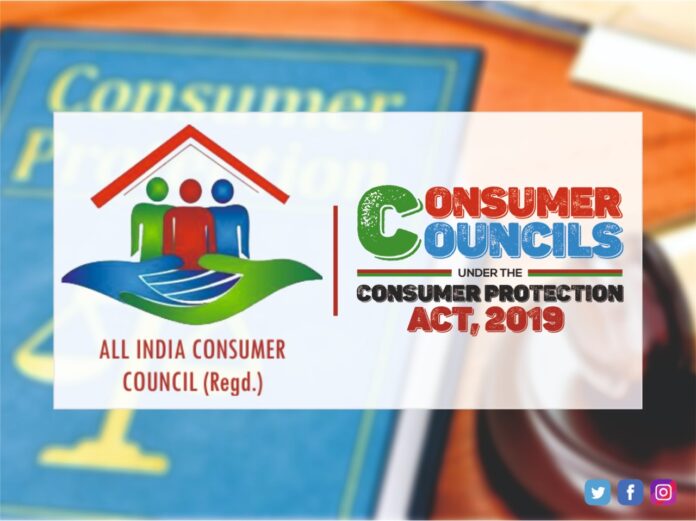HIGHLIGHTS
Consumer Protection Act, 2019 replaces the Consumer Protection Act, 1986
new Act has several new features such as provisions regarding e-commerce transactions, enhanced pecuniary jurisdiction of the consumer dispute redressal forums, allowance for the online filing of comp
Consumer Protection Act of the Parliament of India is enacted to protect the interests of consumers in India
The Consumer Protection Act is a legislation born out of a dire need for the protection of the rights of consumers by law, to prevent unfair trade practices and monopolisation, and promote transparency in the process of exchange of goods and services. The Consumer Protection Act, 2019 replaces the Consumer Protection Act, 1986. The new Act brings with it changes concurrent with the changing times, and the present age of digitalisation and e-commerce. It has been amended keeping in mind the new set of challenges faced by consumers in the digital age. The new Act has several new features such as provisions regarding e-commerce transactions, enhanced pecuniary jurisdiction of the consumer dispute redressal forums, allowance for the online filing of complaints and additionally, provisions for the establishment of Central Consumer Protection Authority, etc.
The new Act also empowers the central government to establish consumer disputes redressal agencies at the national, state and district levels with the aim to resolve consumer disputes. The Act provides for a central consumer protection council, a state consumer protection council and a district consumer protection council. The objective of these councils is to render advice on the promotion and protection of the consumers’ rights at their respective levels.
Consumers today have no knowledge of the fact that the quality of goods, the price of products, and protection against hazardous products comes under the purview of the Consumer Protection Act. First passed in 1986 and then 2019, The Government of India has made several strict laws so that the rights of consumer are not violated, but due to the ignorance of the consumers, the laws still prove to be weak in terms of implementation and enforcement.
A skilled and effective Consumer Protection Act is very important, as the entire population of India is a consumer in one way or the other. A manufacturer or service provider is additionally a consumer of another product or service. If the manufacturer, service provider and consumer comprehend the interdependence of relations in the market, adulterated, counterfeit and faulty goods and services can be kept under check. It is necessary that the Consumer Protection Act should guarantee honesty in business activities, with high quality goods and services being provided free of defects. It is imperative for transparency in transactions, and thus, complete details regarding the manufacturing, cost, and quality of the product must be furnished to the consumer so as to enable them to make the right choice. Subject to the Consumer Protection Act, implementation of consumer right is truly the greatest responsibility of the Government.
The Consumer Protection Act of the Parliament of India is enacted to protect the interests of consumers in India. It is made for the establishment of consumer councils for the settlement of consumer’s grievances and for matters connected therewith. The Council is instituted with the task of enhancing consumer welfare and empowering consumers to make sure their rights are protected. The objects of the Central Council, State and District Councils are to render advice on promotion and protection of the consumers’ rights under this Act, according to Sections 5, 7 and 9 of the Consumer Protection Act, 2019.
The Central Council will be an advisory council and will consist of the following members:
the Minister-in-charge of the Department of Consumer Affairs in the Central Government, who shall be the Chairperson; and such number of other official or non-official members representing such interests as may be
prescribed.
A State Council shall be composed of the subsequent members, namely: the Minister-in-charge of Consumer Affairs in the State Government who shall be the Chairperson; such number of other official or non-official members representing such interests as may be prescribed; and such number of other official or non-official members, not exceeding ten, as may be nominated by the Central Government.
.
The District Forum shall have the jurisdiction to entertain claims upto Rs. 1 Crore under the 2019 Act, as opposed to the earlier pecuniary jurisdiction of Rs. 20 Lakh. The State Forum shall be empowered to entertain claims between Rs. 1 Crore to Rs. 10 Crore, along with complaints against unfair contracts up to Rs. 10 Crore. The National Commission will hear claims above Rs. 10 Crore along with complaints against unfair contracts above Rs. 10 Crore. A complaint can be instituted in a District or State Commission within the local limits of whose jurisdiction the complainant resides or personally works for gain.
The idea of Consumer Protection Councils, along with Consumer Forums seems to be promising. Consumers should feel relieved that such elucidated provisions and mechanisms are available at their behest, to help them get justice easily and quickly. However, it has been generally found that the Consumer Protection Act and its provisions are not ineffective per se, but the Act has been poorly implemented. Moreover, the apathy of the governments and other stakeholders, as well as the consumers, leads to this. The effectiveness of the Consumer Protection Act is marginal as far as the redressal of consumer complaints is concerned.12 The consumer councils are generally slow in dispensing justice, and are not as cost effective as envisaged. Because of such factors, the consumers are gradually losing faith in the redressal forums and councils. Even the compensation given to consumers is too small, and it does not seem to favour the consumers to file a complaint.
It has also been found that the delay in dispensation of justice on part of the councils is due to the involvement of lawyers in all cases. Lawyers are involved and appear in all cases, making the proceedings too technical, cumbersome, and expensive. In fact, the councils have become seemingly more like civil courts.
Another factor behind the ineffectiveness of consumer councils is their lack of proper infrastructure. Because of this, they are unable to serve speedy justice. There is also poor management of records, shortage of manpower and the required skill and knowledge of members of the councils. Moreover, since there are three levels of the councils, it is difficult to fill the vacancies at all these three levels. This reduces the manpower required to deal with the plethora of consumer disputes cases. Thus, it adds to the large pendency of complaints.
It has also been observed that although there has been computerization done in these councils, it has not been as effective as expected because the members lack the knowledge and skills required to operate these computers. Even the internet connectivity has been inadequate to support the speediness of the job. It is such minute yet important details that lead to the ineffectiveness of these councils, ultimately resulting in the lack of trust among consumers. Because of this, consumer councils have proved incapable of protecting the interests of the consumers of the country.
The consumer protection councils have also lack effectiveness due to the fact that they have not been properly and completely constituted of their members quickly. They are fully constituted after a long delay. And even after being constituted after the delay, they remain dysfunctional and purposeless. The meetings seem to be a formality and a ritual, without any worthwhile agenda. There seems to be no drive among the members to improve the working of the councils, and no productive discussions are held.
It has also been found through studies conducted by the Centre for Consumer Studies, that people are not aware of the consumer councils at the various levels. This lack of awareness, combined with their bad reputation, further drops the success rates of these councils. Although the lack of awareness of the consumers is not due to the fault of the government, it should be ensured that more awareness is spread regarding these bodies, so that people can approach them whenever needed.
Another fact pertaining to the consumer councils is that there is an alarmingly low rate of female complainants in these forums. The male to female complainant ratio is almost 3:1, meaning that 3 times as many males approach these councils, as compared to females. This is also a major drawback to the working and effectiveness of consumer councils. These councils must be easily accessible to everyone, and must provide justice easily and quickly, so that people don’t feel intimidated or uninterested in approaching these councils. Further, education regarding these councils and the forums should be provided to everyone, so that they feel empowered to approach these redressal mechanisms.
Studies have shown that only 28.1% of the complainants or appellants are satisfied with the functioning of the three-tier redressal mechanism. This is an extremely low rate of satisfaction, and shows to be a problem for the consumers, who should be empowered and motivated through such provisions, available for the sole purpose of providing them justice.
Therefore, it is seen that the Consumer Protection Councils are not as effective as they were envisioned to be due to the lack of proper and strict implementation of the provisions under the Consumer Protection Act. These shortcomings of the consumer councils lead to dissolution of trust and faith of the consumers in the justice system.










